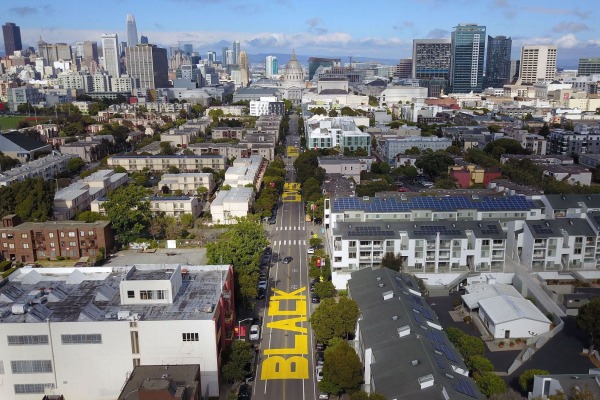
In the midst of what has been and continues to be a devastating time in our country, today is actually a good day to celebrate both Juneteenth and the recent legal victories for our immigrant and LGBTQ communities.
Today, June 19 celebrates the end of slavery in the United States. While it has been celebrated widely across the country for more than 150 years, it has achieved new prominence during a time when our country finally begins to grapple with - and dismantle - the systemic racism that plagues this country. This quarter’s edition of Equity Times, the official newsletter developed by the CCSF Office of Student Equity, provides an excellent history of the holiday:
“Juneteenth is the oldest nationally celebrated commemoration of the ending of slavery in the United States. Dating back to 1865, it was on June 19th that the Union soldiers, led by Major General Gordon Granger, landed at Galveston, Texas with news that the war had ended and that the enslaved were now free. This was two and a half years after President Lincoln’s Emancipation Proclamation which had become official January 1, 1863.
There have been several attempts to make Juneteenth a national holiday, and it is my hope that our elected officials will finally give the holiday the recognition it deserves.
If you’re looking for more ways to (safely!) celebrate Juneteenth, the San Jose Mercury News and the San Francisco Chronicle have also created lists of events throughout the Bay Area. And I hope you’ll take some time to visit our African American Program Studies page to learn more about the College’s academic offerings and the resources we offer to our Black students.
Court Wins for our Immigrant Community!
This week brought some huge wins for our nation’s immigrant community. Just two days ago, the US Supreme Court issued a ruling that preserves the Deferred Action for Childhood Arrivals (DACA) program, which provides protected immigration status to 700,000 young people across the United States, and 70,000 students within the California Community College District. The Trump administration’s attempt to abruptly end DACA in 2017 instilled terror in the hearts of so many at City College, and as a sanctuary college in a sanctuary city, we vowed to stand with – and protect – our immigrant community.
And thankfully, because the Supreme Court found the Trump administration’s attack on DACA to be legally unfounded, the DACA program will continue! Thank you to all at City College who continue to support our undocumented students through resources like the City DREAM Center and Legal Services for Undocumented Immigrants.
Also, this week, U.S. District Judge Yvonne Gonzalez Rogers of Oakland ruled that CARES Act funding should be available to all students regardless of citizenship status, another ruling affirming the rightful place of immigrants in this country’s educational institutions. Because CCSF has already distributed all of the $3.5 million in emergency grants to students, we are exploring additional possible funding sources to retroactively provide these grants to students who qualify. We look forward to sharing more information about this soon!
Landmark Protection for the LGBTQ Community
The US Supreme Court issued yet another (long overdue) landmark decision prohibiting employers from discriminating against anyone on the basis of sexual orientation or gender identity. While it has long been illegal to discriminate against someone on the basis of race, gender, or religion, sexual orientation and gender identity have been inexplicably left out of these codified protections for far too long. Starting today, all workers across the United States will have the legal protection to show up to work truly as themselves. And while peoples’ hearts and minds do not change overnight, we can finally say the law is on our side. We’d like to encourage all members of our community to visit our LGBT Studies program to learn about the academic offerings at CCSF, and to view the resources available through the College’s Queer Resources Center.
After hundreds of years of work, countless deaths, and seemingly endless struggle, our country is changing perhaps slower than we all would like, but change is coming.
In Solidarity,
Dianna
